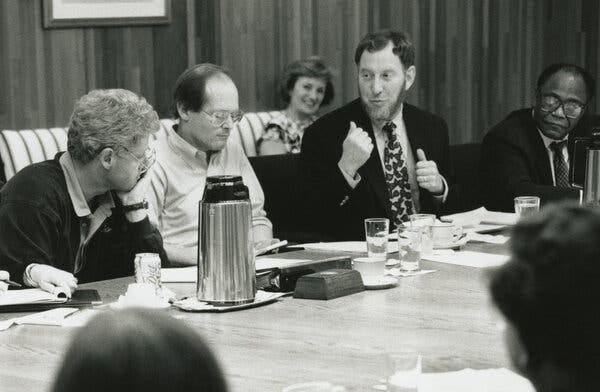What is power, and who has it?
Jon Stewart, Elizabeth Kolbert, and Robert Putnam confront the seductions of a dangerous illusion.
Do you ever wonder if you truly have an impact on anything or anyone beyond, say, the people closest to you?
Do you ever wonder if your words or images or songs or poems or paintings or whatever you might write or compose or create will have any effect beyond… you?
Do you ever wonder if your life’s work might be as ephemeral as this moment, the one you’re in right now, the one that’s… poof! It’s gone!
If so, you’re in excellent company.
I. Rolling a gutter ball
From “Robert Putnam Knows Why You’re Lonely,” an interview by Lulu Garcia-Navarro in The New York Times, July 13, 2024:

More than two decades ago, Robert Putnam became something rare: a celebrity academic. In 2000, he published a groundbreaking book, “Bowling Alone: The Collapse and Revival of American Community,” in which he demonstrated, with copious data, that America was transforming from a nation of joiners to a nation of loners — we were going to church less, joining clubs less and, he warned, losing trust in our fellow Americans and our institutions. But even before the book reached shelves, Putnam’s work attracted widespread attention, including from President Bill Clinton, who invited him to the White House. For a moment it seemed as if those in power might work toward reversing the trends Putnam warned about.
Spoiler alert: The trends did not reverse.
From the interview:
Robert Putnam: Twenty-five years ago, I essentially predicted everything that was going to happen. That’s a little exaggerated, but not much. And yet they happened. I’ve been a little bit of an Isaiah, preaching how awful things are. One person once said I was like an Old Testament prophet with charts. I’ve been working for most of my adult life to try to build a better, more productive, more equal, more connected community in America, and now I’m 83 and looking back, and it’s been a total failure.
Think about this for a minute.
Robert Putnam is a (retired) Harvard University professor. In 2013, he was awarded the National Humanities Medal by President Barack Obama for “deepening our understanding of community in America.” In 2015, he was awarded the University of Bologna ISA Medal for Science for research activities characterized by excellence and scientific value.
In 2006, he was awarded the Johan Skytte Prize in Political Science and a Wilbur Lucius Cross Medal by the Yale Graduate School of Arts and Sciences. He was a Marshall Lecturer at the University of Cambridge in 1999 and was honored with the Ithiel de Sola Pool Award and Lectureship of the American Political Science Association. He has received honorary degrees from Stockholm University (in 1993), Ohio State University (2000), University of Antwerp (also 2000), University of Edinburgh (2003), University of Oxford (2018), and University College London (2019).
That’s quite a resumé, right? Yet after all those achievements and accolades, Putnam says: “I’ve been working for most of my adult life to try to build a better, more productive, more equal, more connected community in America, and now I’m 83 and looking back, and it’s been a total failure.”
So, what is power, and who has it?
II. Tears of a clown: “Cultural power isn’t power.”
I’ve always wanted to ask Jon Stewart these questions.
David Remnick finally did.
(The full interview is here.)
So, again: What is power, and who has it?
III. Mountains and mountains of words
Elizabeth Kolbert is a Pulitzer-Prize winning author and a staff writer for The New Yorker. During an interview a few years ago on the Longform podcast, Elizabeth was asked if, when she sits down to write about climate change (her specialty), she thinks her stories will make any difference. Does she believe her stories will change anything? Here’s part of her answer:
“I think that’s what motivates most journalists—this information is going to somehow make a difference. On the other hand, I have dispensed with a lot of that.”
This is the same sentiment expressed by Jon Stewart (above), minus the jokes.
If a staff writer for The New Yorker thinks her work doesn’t make a difference anymore, then what does that mean for the rest of us schleppers who labor in far more obscure and less influential vineyards? What difference can we possibly make?
(When I heard Elizabeth “dispense” with “making a difference,” I asked her for an interview, and she graciously agreed. Here’s my chat with her from 2019… not that it’ll make any difference 🙃):






Did Goebbels not have power?
Jon Stewart was at the forefront of making antizionist propaganda palatable and widespread. Both him and his successors lied constantly about rounds of warfare initiated by Hamas from Gaza. He always forgot to mention that Israel gave the entire Gaza Strip as “land for peace” to the Palestinians, yet was rewarded with constant terrorism. He always pushed the lie that “proportionally” is about the casualty numbers, and always reported the fabricated Hamas numbers as fact. He always made the claims that Israel should not be allowed to fight back against Hamas since the Palestinians use their people as human shields.
Stewart is one of the main people behind the wave of antisemitic violence carried out against Jews in the diaspora. Of all the disingenuous Jew-hating ‘progressive’ token Jews, he is one of the worst and most consequential. He is one of the biggest pro Hamas propaganda spreaders of the Free Palestine cult, and he’s still shamelessly at it.